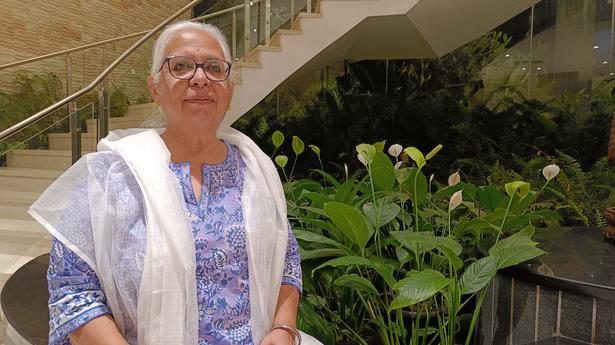
Many hats sit easy on this filmmaker’s head
The Hindu
But Reena Mohan, recipient of the Lifetime Achievement Award at the 14th IDSFFK, considers herself primarily as an editor
Reena Mohan took her first steps in documentary filmmaking and editing at a time when very few women were active in the field. Women like her getting an admission into the Film and Television Institute of India (FTII) were often looked down upon for "taking away a boy's seat". Decades later, when news broke earlier this month that she was chosen for the Lifetime Achievement Award at the 14th International Documentary and Short Film Festival of Kerala (IDSFFK), she was inundated with messages from girls and women, many of them unknown to her.
"I was extremely surprised by the award because it is unusual to give it to a technician, and I largely see myself as one, primarily as an editor. But I understand that they are also celebrating the many other hats of director, curator and mentor that I am wearing. After all those messages from women, I suddenly see this as something that seems to hold a lot of significance to a lot of women," says Ms. Mohan in an interview to The Hindu.
She has directed 10 documentaries, edited several features, over 50 documentaries, and a television series. When she set out to do her first documentary, she went far back into the history of Indian cinema, tracing the life of one of the first women to be seen on our screens - Kamlabhai Gokhale, who played the lead character in Dadasaheb Phalke's second film Mohini Bhasmasur. An old magazine interview led her to Kamlabhai, who was then leading an obscure life, with her own neighbours unaware of her significance. Finding funds as a debutant for the documentary film, which was shot on 16mm celluloid, was also hard.
She initially shot a rough cut and showed it to her friends, who told her their honest opinion - It's boring, unlike the interesting portrait of the woman that she had conveyed to them earlier. That made her realise the mistake she was making. She was always switching off the camera whenever she was being funny and alive, and using unparliamentary language. In the shooting that happened in the subsequent years, she kept the camera running, an act which paved the way for the National Award-winning documentary Kamlabhai, which has an ebullient 90-year old recapturing the memories of her heyday on screen and stage.
“It wasn’t so difficult being a director, but it was very difficult finding the form of the film. In each film, time is taken in evolving the form. I once heard about a woman who went through a renunciation ceremony. I wrote a proposal that I want to follow her for the first six months of her renunciation. I got the funding from Public Service Broadcasting Trust (PSBT), but the sect wouldn’t allow me to follow her. Although I was close to opting out, PSBT asked me to go ahead, which was wonderful. Thus On an Express Highway was made,” she says.
Even when she encounters people saying politically incorrect things on camera, like some of the men in her documentary Skin Deep, she has learned to take it calmly.
"I don't feel angry. I think as a filmmaker you also need to have a lot of empathy towards human beings and accept a lot of things that are shared with you. You have to tell your story through their words. As a filmmaker you are also jubilant about the material you are getting," she says.











